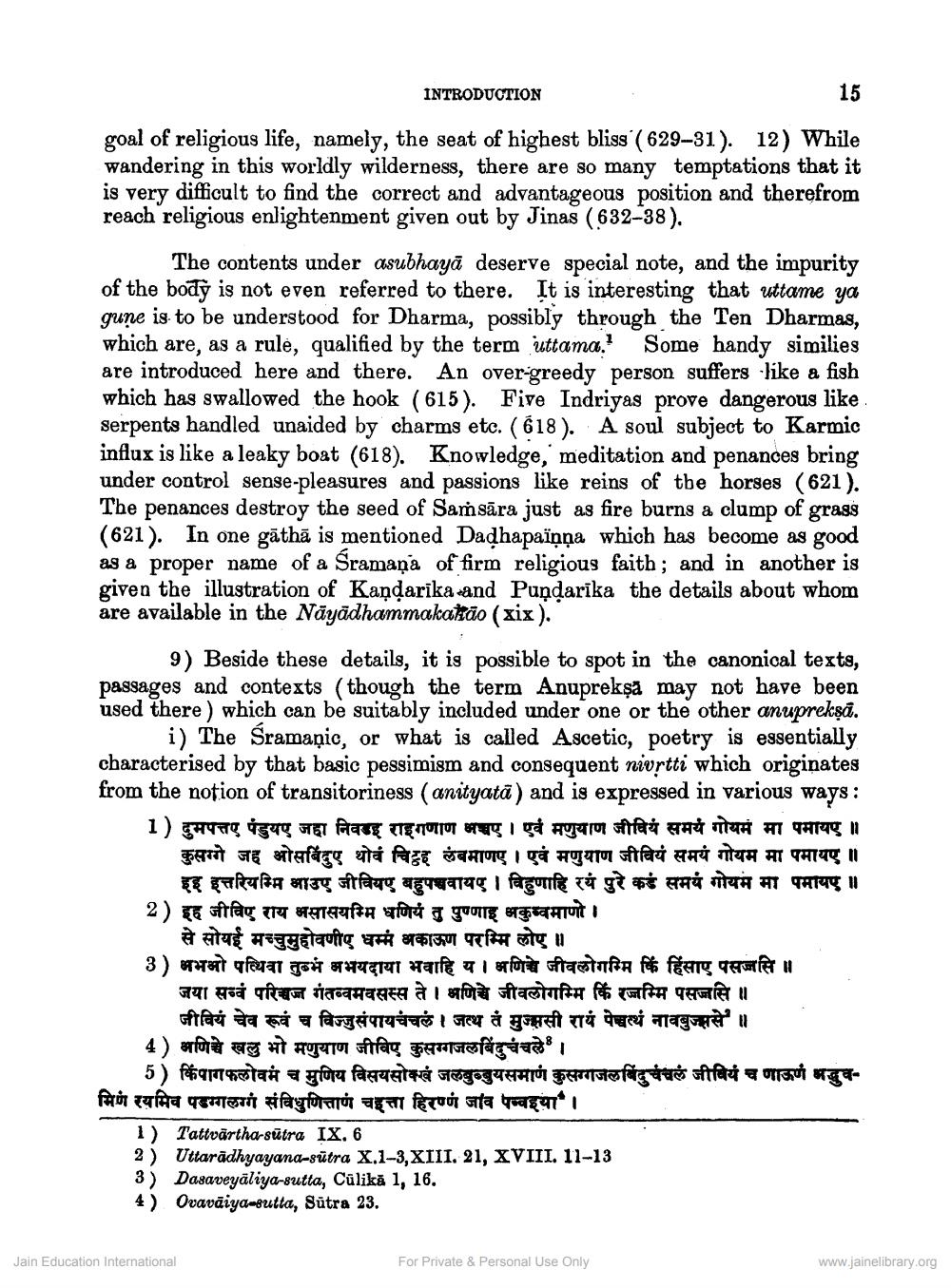________________
INTRODUCTION
15
goal of religious life, namely, the seat of highest bliss (629-31). 12) While wandering in this worldly wilderness, there are so many temptations that it is very difficult to find the correct and advantageous position and therefrom reach religious enlightenment given out by Jinas (632-38).
The contents under asubhayā deserve special note, and the impurity of the body is not even referred to there. It is interesting that uttame ya gune is to be understood for Dharma, possibly through the Ten Dharmas, which are, as a rule, qualified by the term uttama. Some handy similies are introduced here and there. An over-greedy person suffers like a fish which has swallowed the hook (615). Five Indriyas prove dangerous like . serpents handled unaided by charms ete. (618). A soul subject to Karmic influx is like a leaky boat (618). Knowledge, meditation and penances bring under control sense-pleasures and passions like reins of the horses (621).
penances destroy the seed of Saṁsāra just as fire burns a clump of grass (621). In one gāthā is mentioned Dadhapaïņņa which has become as good as a proper name of a Sramaņa of firm religious faith; and in another is given the illustration of Kandarika and Pundarika the details about whom are available in the Näyādhammakakao (xix ).
9) Beside these details, it is possible to spot in the canonical texts, passages and contexts (though the term Anuprekşă may not have been used there) which can be suitably included under one or the other anupreksā.
___i) The Sramanic, or what is called Ascetic, poetry is essentially characterised by that basic pessimism and consequent nivrtti which originates from the notion of transitoriness (anityatā) and is expressed in various ways: 1) दुमपत्तए पंडुयए जहा निवडइ राइगणाण मञ्चए । एवं मणुयाण जीवियं समय गोयम मा पमायए॥
कुसग्गे जह ओसबिंदुए थोवं चिट्ठह लंबमाणए । एवं मणुयाण जीवियं समयं गोयम मा पमायए।
इइ इत्तरियम्मि माउए जीवियए बहुपचवायए । विहुणाहि रयं पुरे कडं समय गोयम मा पमायए॥ 2) इह जीविए राय असासयम्मि धणियं तु पुण्णाइ अकुम्वमाणो।
से सोयई मच्चुमुहोवणीए धम्म अकाऊण परम्मि लोए ॥ 3) अभओपस्थिवा तभं अभयदाया भवाहि य । अणिचे जीवलोगम्मि कि हिंसाए पसजसि ॥
जया सवं परिचज गंतव्वमवसस्स ते । मणिचे जीवलोगम्मि किं रजम्मि पसज्जसि ॥
जीवियं चेव रूवं च विज्जुसंपायचंचलं। जत्थ तं मुझसी रायं पेश्वत्थं नावबुज्झसे। 4) मणिचे खलु भो मणुयाण जीविए कुसग्गजलबिंदुचंचले ।
5) किंपागफलोवमं च मुणिय विसयसोक्खं जलबुब्बुयसमाण कुसग्गजलबिंदुचंचलं जीवियं च णाऊणं मद्धवमिण रयमिव पडग्गलग्गं संविधुणित्ताणं चइत्ता हिरणं जाव पन्वइया ।
1) Tattvārtha-shtra Ix.6 2) Uttarādhyayana-sutrax.1-3.XIII.21.XVIII. 11-13 3) Dasaveyaliya-sutta, Cūlikā 1, 16. 4) Ovavāiya-sutta, Sutra 23.
Jain Education International
For Private & Personal Use Only
www.jainelibrary.org




